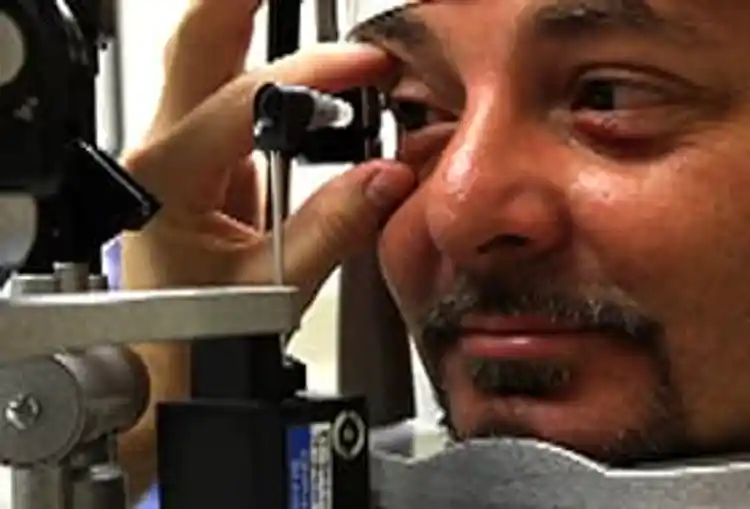Glaucoma

Hide Video Transcript
Video Transcript
Music.
What I want you to do is look straight ahead.
Very good. Excellent.
Michael Banitt, MD
It gets very close but nothing hurts. Very, very still. Excellent. You don't feel it. You don't experience any symptoms until the glaucoma is so advanced that it affects your central vision. Narrator
He's talking about open-angle glaucoma, the most common type of glaucoma and a leading cause of blindness. Could you have it? Getting regular comprehensive eye exams is really the only way to know for sure. Michael Banitt, MD
You're evaluating whether the optic nerve is normal or it's damaged. Narrator
Dr. Michael Banitt is an ophthalmologist with Bascom Palmer Eye Institute in Miami. He says the peripheral vision is often the first to go. Michael Banitt, MD
It's a very chronic disease that happens very slowly over a long period of time -- years generally. Narrator
These arrows illustrate normal intraocular fluid flow. In glaucoma the flow can become interrupted, causing it to back up. This in turn can produce a pressure buildup. You may not feel anything, but over time, it can damage the optic nerve, the visual gateway into the brain. Though elevated eye pressure is a common occurrence, even people with normal eye pressure readings can develop glaucoma. And in some instances, eye pressure can rise unexpectedly and radically, as is sometimes the case with the less common angle-closure glaucoma. Michael Banitt, MD
Someone usually comes in in significant pain. It's not something you would go through the day with. It stops your day it's so intense. Narrator
Is it too late at that point to save their vision? Michael Banitt, MD
You can save their vision, so it's not too late to come in. Definitely you have to come in. You can always save some vision, but there's going to be some damage that occurs from that. You break the attack generally with a laser procedure. Narrator
There's no cure yet for glaucoma, and vision lost from the disease cannot be regained. But there are effective treatments which can halt further vision loss. Michael Banitt, MD
It commits them to usually drops, laser treatment, or surgery for life and being checked forever. What I want you to do is look straight ahead.
Narrator
Glaucoma rates are expected to rise significantly over the next decade, and high-risk groups, like those with family members who have the disease, African-Americans, and anyone over 60, are especially vulnerable. Aside from getting regular eye exams, taking on a few healthy habits can't hurt either, because glaucoma ... Michael Banitt, MD
... likely has its roots in the circulatory system or the micro-circulatory system around the optic nerve. So having a good, robust circulatory system coming from good exercise and a good diet is, I think, very important. Very good. Excellent.
Narrator
For WebMD, I'm Damon Meharg.